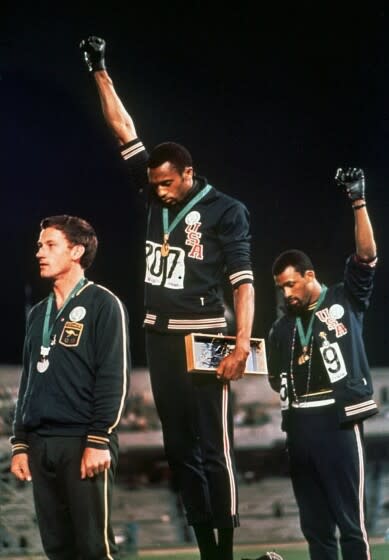Malcolm Gladwell podcast examines iconic 1968 Olympic protest and its San Jose roots
- Oops!Something went wrong.Please try again later.
- Oops!Something went wrong.Please try again later.
- Oops!Something went wrong.Please try again later.
- Oops!Something went wrong.Please try again later.

As “The Star Spangled Banner” sounded, tension extended through their arms and into their clinched, black-gloved fists. Tommie Smith and John Carlos wanted the world to know America’s great stain.
But it was not rigidness as displayed in the gold and bronze medalists’ hands that placed the American sprinters onto the podium at the 1968 Olympics in Mexico City. It was relaxation.
Their coach at San Jose State, Bud Winter, cultivated a new sprinting technique. No more tensed jaws. No more balled fists. Instead, open palms. A smooth gait. A softened face for optimum speed.
The breakdown of Winter’s running revolution kickstarts “Legacy of Speed,” a new podcast from Malcolm Gladwell, a New York Times bestselling author. Inspired by the iconic photo of Smith and Carlos at the 1968 Games, the podcast explores the rise of San Jose as “Speed City” and the background of the sprinters’ protest after their 200-meter run performance.
“It’s this moment of activism and protest that absolutely stunned the world,” Gladwell said. “And we wanted to understand what happened, how did that come to pass … and what were the reverberations of that act?”
Winter’s technique helped the San Jose State sprinters become among the best in the world.
Gladwell was struck by arguably the most famous photo in sports and created the podcast to introduce the story behind it. The intersection of the International Olympic Committee’s objection to any sort of protest; San Jose emerging as an unlikely breeding ground for sprinters, earning the nickname Speed City; how the San Jose sprinters in the photo decided to protest and inspired others to join them; and the aftermath.
The Times has previously reported IOC president Avery Brundage, who supervised the 1968 Olympics, was widely known as racist and antisemitic. Brundage greenlit the 1936 Olympics to take place in Berlin despite Nazi rule in Germany.
Years later, Brundage and the IOC wanted to invite white supremacist regimes from South Africa and Rhodesia to the Games. They also pushed amateurism, stressing athletes should perform out of pure love for sport and for no financial compensation.
The podcast highlights of this put the IOC on a collision course with the sprints being developed in San Jose amid difficult circumstances.
Winter had limited scholarships available, so many of his athletes, largely recruited from inner-city neighborhoods in the Bay Area and Los Angeles, struggled to eat in the city plagued by racism.
“Amateurism meant back then that the athlete had to turn a blind eye to everything that was going on in society,” Gladwell said. “To this group of guys, Carlos and Smith and Harry Edwards, that just made no sense. … You’re supposed to go to the Olympic Games, perform in front of the world, and all of a sudden you’re not supposed to talk about what it means to be a Black person in America?”
Smith and Carlos rejected this. Edwards, a discus thrower at San Jose State in the '60s, was the architect behind their Black power salute. Since then, he’s focused on advancing athlete activism and most recently mentored Colin Kaepernick.
Gladwell’s podcast comes at a time when athlete activism is on the rise. Dozens have followed the lead of Smith and Carlos. Dozens want to silence them. The IOC still has policies in place limiting athlete protest.
Before the 2020 Tokyo Olympics, Rule 50 of the Olympic Charter stated that in “any Olympic sites, venues or other areas,” the committee will not allow “demonstration or political, religious, or racial propaganda.” The rule has since been modified to grant athletes the opportunity to speak out during news conferences, mixed zones, interviews or ahead of competition. Last year, dozens of athletes and organizations signed an open letter calling to ban Rule 50.
Smith and Carlos were expelled from the Games after Brundage threatened to ban the whole U.S. track and field team if they weren’t removed. They faced criticism at home and received death threats.
Peter Norman, the Australian silver medalist, did not raise his fist, but he did wear a human rights badge in solidarity with the Americans. Australian Olympic authorities prevented him from competing in another Games, despite his making qualifying times in 1972.
“It’s a tiny example of just how much depth and complexity and complication there is in that picture,” Gladwell said.
Gladwell said he doesn’t understand why anyone could react so negatively to an athlete giving up their glory to speak out against injustice.
“There remains this kind of extraordinary fear at what protest does to America’s sense of themselves,” Gladwell said. “Why should someone reaching outside of themselves to talk about a much more important topic of how society treats its own, why should that make us fearful or angry?”
This story originally appeared in Los Angeles Times.

